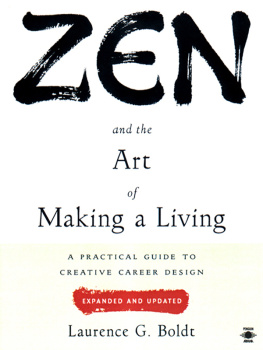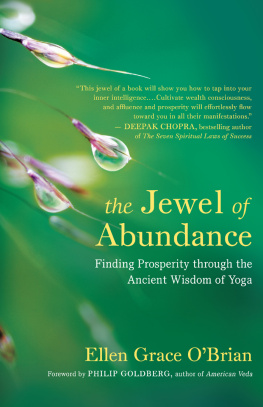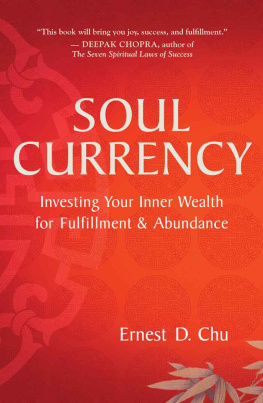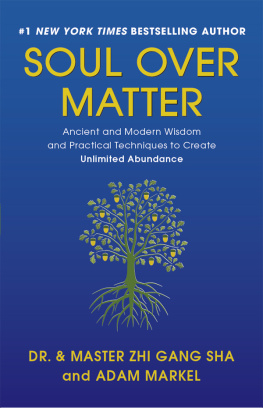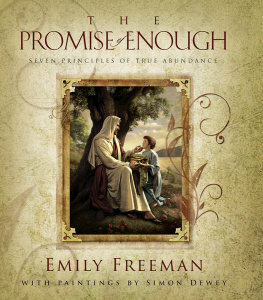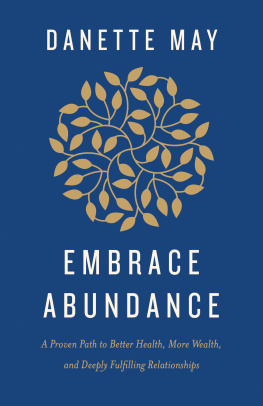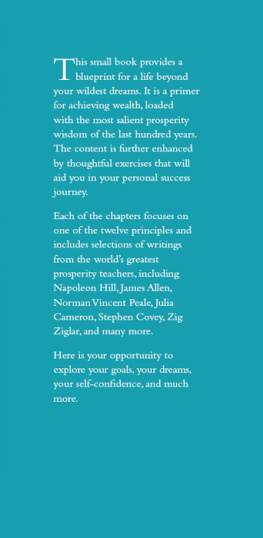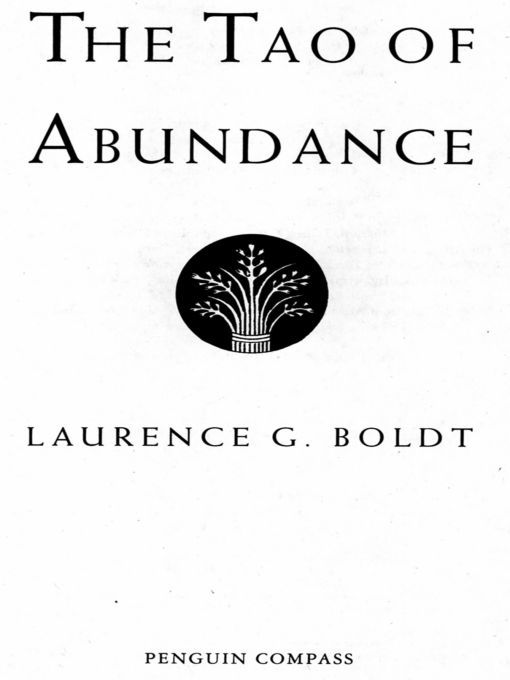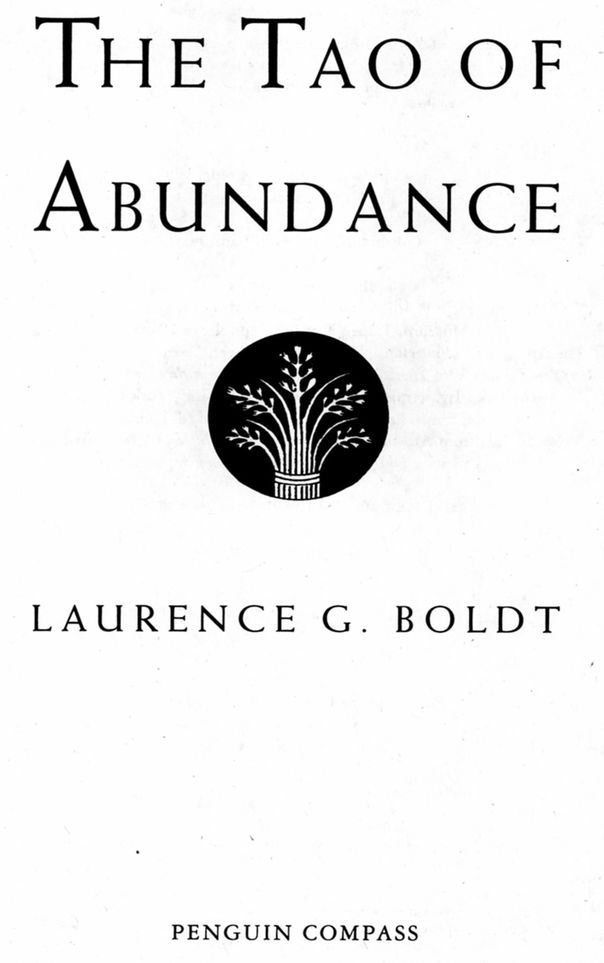Table of Contents
THE TAO OF ABUNDANCE
Laurence G. Boldt, author of the bestselling Zen and the Art of Making a Living, is a nationally known writer and career consultant. He has given speeches and conducted workshops across the country and has been featured in such publications as New Age Journal and Newsweek. His previous books include How to Find the Work You Love and Zen Soup, both available in Penguin Compass.
Achieve success, but without vanity;
Achieve success, but without aggression;
Achieve success, but without arrogance;
Achieve success, but without gain;
Achieve success, but without force.
Lao Tzu
To Tina, who brings abundant joy to my life
ACKNOWLEDGMENTS
I would like thank several people whose assistance has been indispensable in bringing this book to life. It is difficult to express in mere words how much your help has meant to me or how deeply grateful I am for it. Susan Shapiro did the entire layout of the book. She contributed many good ideas to the interior design as well. Beyond this, her dedication and commitment to the projectexpressed in ways too numerous to counthas been a phenomenal help. Also invaluable was the editorial help I received from Kim Grant. Her sharp eye and sensitive ear, combined with her vast knowledge of editorial minutiae, contributed much to the quality of the finished project. Thanks, Kim, for all your help over the years. I also want to thank Tina Kolaas for her help in copyediting, her continued moral support, and-most of allfor being who she is in my life.
Thanks to Steven Jian Chen for the calligraphy. Also thanks to Janet Goldstein, my editor, and her assistant Allison Hastings at Penguin.
PREFACE
Whether we hear news reports of good economic times or bad, whether we make a lot of money or a little, many of us feel that something is missing in our lives. I wrote this book because I wanted to address the real sense of lack that people feel in their lives today and offer some practical suggestions for bringing greater abundance into them. I think that today, in many ways, weve become confused about what real abundance is. In reducing it to something that can be measured in abstract economic terms, weve substituted a concept of abundance for the experience of it. It is my hope that this book will prompt readers to consider for themselves what real abundance means to them and how they can go about creating it in their own lives. I further hope that it will prompt readers to begin challenging the notion that they live in a world of scarcity and lack. It is not the world that is insufficient. It is the way we relate to it, to one another, and to the deepest parts of ourselves that is the source of our problem.
This is not a book about Taoism. It is a book that applies insights from Taoist philosophy to the situation we in the West find ourselves in at the beginning of the twenty-first century. The question occurs as to why the Taoist philosophy? Apart from my own long-standing interest in the subject, I believe that, for a variety of reasons, the Taoist perspective is particularly relevant to our situation today. In a world that defines abundance in terms of scarce resources and economic abstractions, the Taoist philosophy defines abundance in human terms and sees the world as a naturally abundant place. In a do-oriented society that puts its faith in future progress, it reminds us to be, and that here and now is the only place we live. In a world caught up in glamour and obsessed with consumption, the Taoist perspective offers an appreciation of leisure and beauty in the simple things in life. In a society that values the cerebral and abstract, the Taoists remind us to trust our intuitions and to recognize the power of the unconscious intelligence. In an increasingly narcissistic and artificial society, Taoist philosophy values humility, naturalness, and spontaneity.
In a world facing a major ecological crisis, the Taoist philosophy offers a path to regaining a sense of connection and cooperation with nature. In a world confused about the relationship between the sexes, the Taoist perspective offers a path to harmony and cooperation, based on a mutual respect for the roles that the inner and the outer feminine and masculine play in all of life. In a world obsessed with celebrity and social status, it reminds us to value our own human dignity above any prize or outer recognition. In a world where we too often neglect the inner or spiritual dimension of life, the Taoists remind us to cultivate the treasures that lie within. In a world where people are confused about their place in the world and their own direction in it, the Taoist philosophy tells us that every living thing has a place in the natural order of things and that each has its own destiny to fulfill. I could go on, but all of these things and many more will come out in the course of the book.
For the reader who is new to Taoist philosophy, or for those who would like a concise overview of the same, Ive included a chapter entitled The Five Fingers of the Tao. Because it is not essential to the discussion on the Tao of Abundance, Ive placed it at the beginning of the book. Some readers may want to turn to it first, to get a grounding in fundamental Taoist concepts before proceeding to the main body of the work. Others may choose to begin with the introduction and chapter 1 and then, perhaps, come back to it later to reinforce what they have read and place it in a broader context. Ive also included a Tao of Abundance Workbook at the end of the book. I strongly encourage readers to complete the exercises in it, as a way of integrating and applying the principles in their own lives.
As this is intended to be a popular and not a scholarly book, Ive taken a certain license in using phrases such as from the Taoist perspective, the Taoists would say, or the Taoist tells us. In using the word Taoist, one runs into the same problem as when using the word Christian. By Christian, do we mean the sayings of Jesus and the apostles, or do we mean Christianity as taught by the desert fathers or the Christian mystics of the Middle Ages? Even more problematic, do we mean the religion practiced by todays Roman Catholics, Episcopalians, Methodists, Baptists, Pentecostals, Egyptian Coptics, or others who call themselves Christian? Even as Christian can mean many different things to different people, so there are many schools, systems, religious sects and cults with a wide variety of teachings that call themselves Taoist. Like the Christians, todays Taoists have had their own internal squabbles over which faction best represents the True Church.
When I use the term Taoist, I am, by and large, referring to the Tao Chia, or the classical Contemplative School of Taoist philosophy, as expressed by its three principal exponents Lao Tzu, Chuang Tzu, and Lieh Tzu. I will sidestep the debate about whether or not these individuals were in fact the sole authors of works traditionally attributed to them. Whether or not any one of these historical figures (assuming all were historical figures) wrote all, part, or none of a particular work traditionally attributed to him may be an interesting question for scholars, yet is not germane to my purpose in applying the philosophy contained in the works. Though I cite other Taoist sources, I rely mainly on the classic texts of


